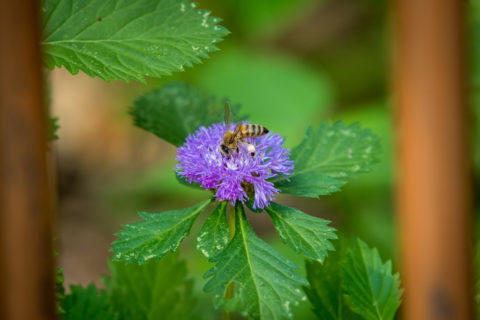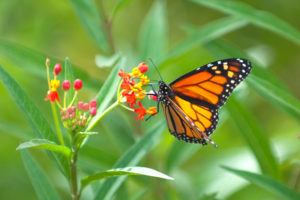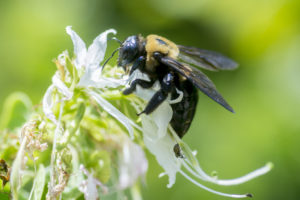Good News: We are Creating Food Gardens for Animal Pollinators
 What better way to celebrate World Bee Day than by shining a light on the importance of animals that are pollinators and learning how you can help? A pollinator is anything that helps to carry pollen from the male part of the flower to the female part of the same or another flower. This process helps the plant become fertilized, and helps it to grow. Common pollinators include bees, wasps, moths, butterflies, birds, flies and small mammals, including bats and lemurs. At the Houston Zoo, we have several pollinator gardens throughout our campus, providing necessary food and shelter for some of these incredible species!
What better way to celebrate World Bee Day than by shining a light on the importance of animals that are pollinators and learning how you can help? A pollinator is anything that helps to carry pollen from the male part of the flower to the female part of the same or another flower. This process helps the plant become fertilized, and helps it to grow. Common pollinators include bees, wasps, moths, butterflies, birds, flies and small mammals, including bats and lemurs. At the Houston Zoo, we have several pollinator gardens throughout our campus, providing necessary food and shelter for some of these incredible species!
 Earlier today, you likely heard on today’s livestream some of the reasons why pollinators are so important. If not, let’s break this down into three simple reasons why pollinators are possibly the coolest group on the planet:
Earlier today, you likely heard on today’s livestream some of the reasons why pollinators are so important. If not, let’s break this down into three simple reasons why pollinators are possibly the coolest group on the planet:
- One out of every three bites of food YOU (yes, you!) eat is made possible by pollinators. Our fruits, vegetables, and nuts/seeds sit on our plates because pollinators have helped them become fertilized and grow (even things like tequila, coffee, and chocolate are only possible because of pollinators!).
- Visits from bees and other pollinators result in larger, more flavorful fruits and higher crop yields. The pollination process done naturally by these insects and animals is valued at around $10 Billion dollars, annually (just in the U.S. alone).
- Healthy ecosystems depend on pollinators. About 75% of flowering plants on earth are pollinated by insects and animals. These plants stabilize our soils, clean the air, give us oxygen, and provide food and shelter for wildlife.

You can help pollinators from your very own patio, yard, or outdoor space here in Houston. Here are a few simple ways to help:
- Plant native, pollinator-friendly plants in your space. Turk’s cap, Texas frogfruit, salvia, and aquatic milkweed are just some of the many plants you could utilize to attract pollinators.
- Avoid using pesticides or any chemicals on your yard/garden – these are harmful to insects and animals.
- Put out water sources for pollinators! Use shallow pools of water, with small stones or rocks to provide water for butterflies, bees, and others.
- Add a bat house to your yard.
Visit our Take Action page to learn more about creating a pollinator-friendly space.
With our gates still closed, your support is more critical than ever. Support the Houston Zoo Fund to help us continue our work to connect communities with animals and inspire action to save wildlife.
